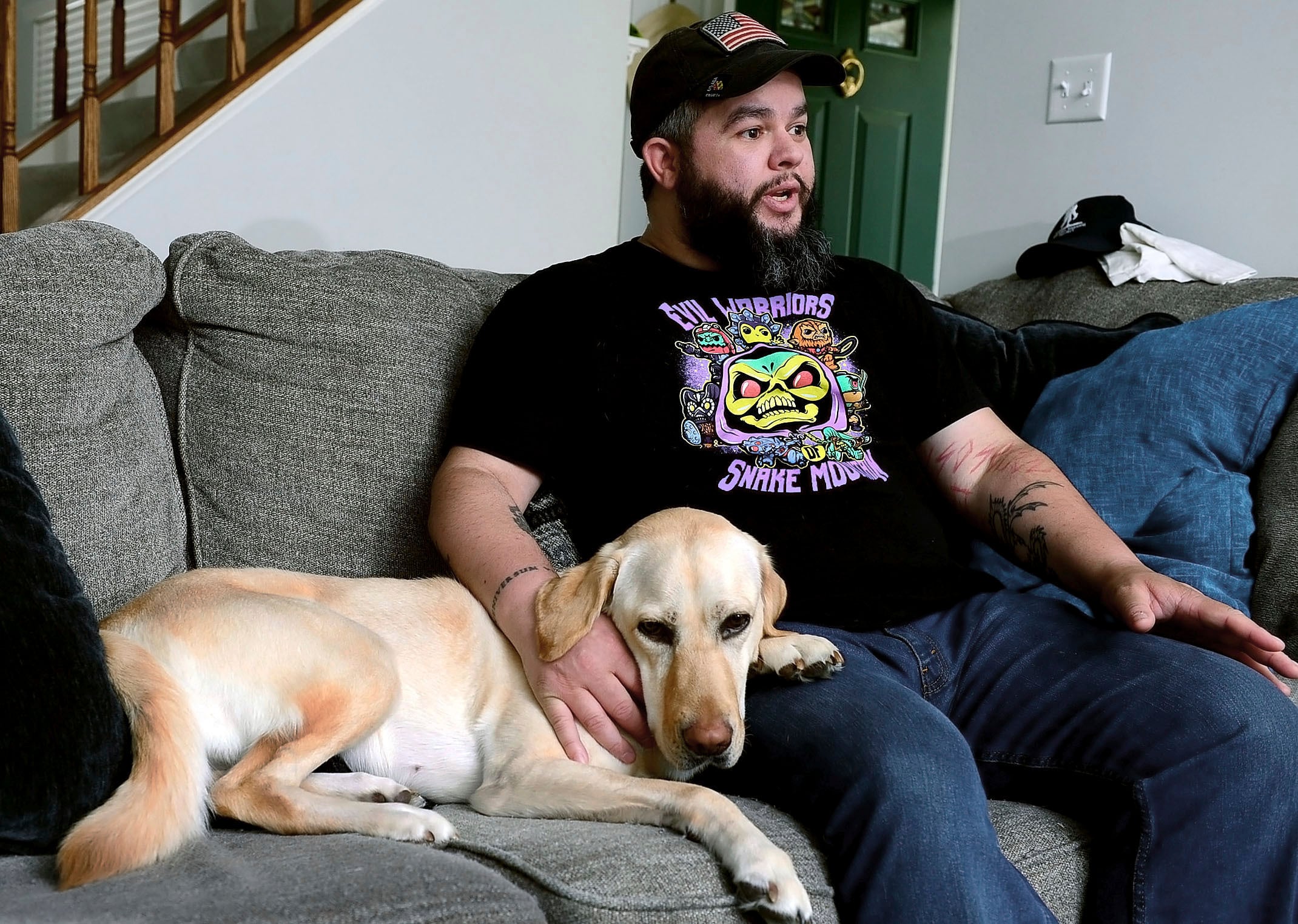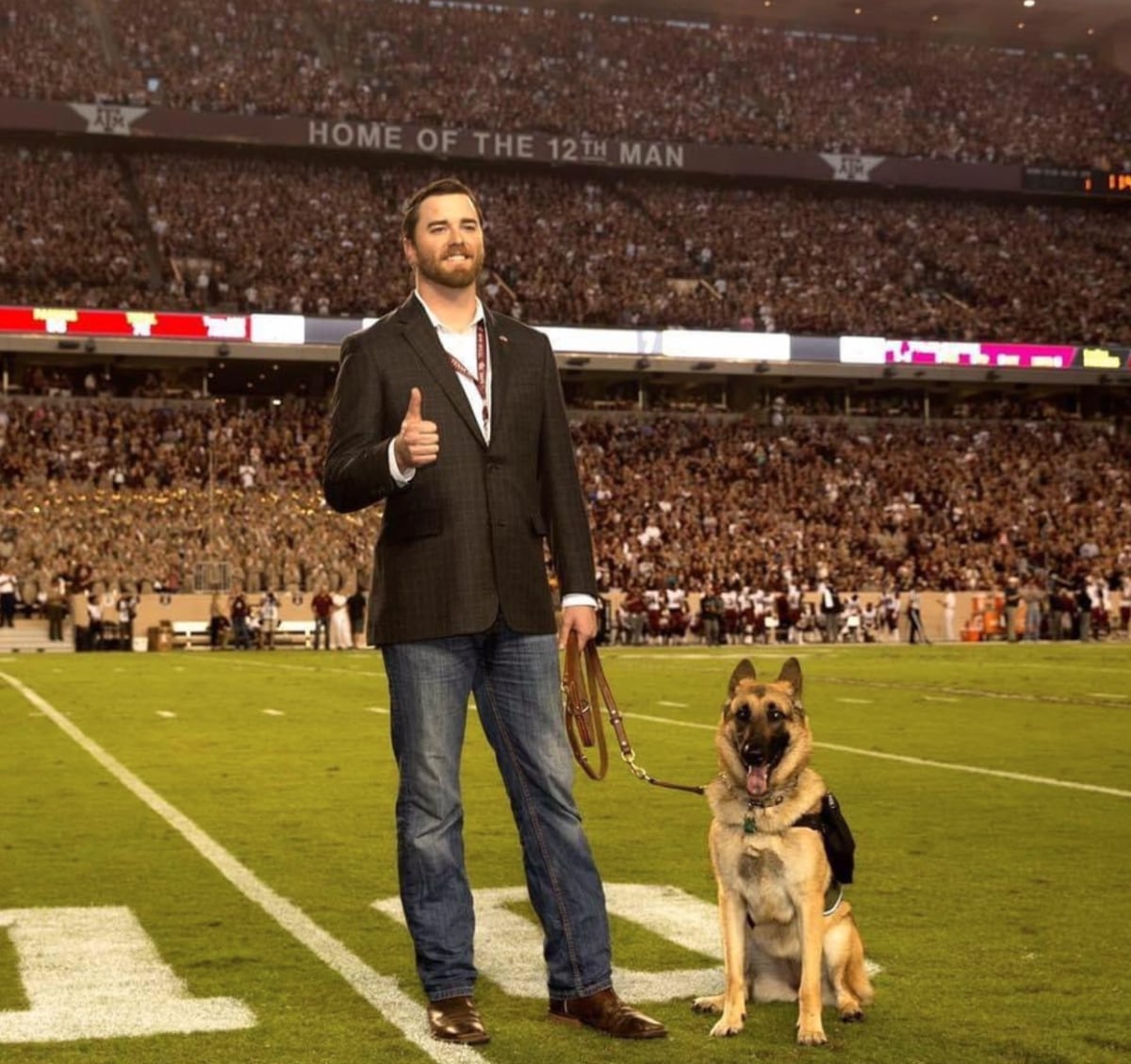When Marine veteran Cole Lyle was lobbying Congress to pass legislation that provides funding for some veterans to get service animals, a congresswoman invited him and his service dog, Kaya, into her office.
The moment they entered, it was obvious from the congresswoman’s face that she had been having a tough day, according to Lyle.
“She said, ‘You know, I’ve already read your bill, and I’m already going to co-sponsor it. Would you mind if I just cuddled with your dog for a few minutes?’” he recalled.
Kaya, a German Shepherd, jumped on the congresswoman’s lap and snored there for five or ten minutes. The congresswoman looked visibly relieved, according to Lyle.
That what Kaya was — good at intuiting when people were upset and comforting them. She made a compelling ambassador for service animal issues, Lyle said.
Kaya, who had recently been diagnosed with incurable cancer, died on Saturday. She left a large impact, not only with the bill that she helped advocate, which passed, but also on Lyle’s life.
Finding purpose through Kaya
Lyle enlisted in the Marine Corps in 2008, serving as a mechanic. He was also trained as a wrecker operator during a 2011 deployment to Afghanistan’s Helmand Province, he said. For one month of his tour in Afghanistan, he volunteered at Camp Bastion’s trauma hospital.
Lyle said it was there that he developed post-traumatic stress — a phrase he prefers to post-traumatic stress disorder.
“I don’t necessarily think it’s a disorder per se because I think people can learn as I did, and as millions of other veterans do, to mitigate those symptoms and to live a full and complete life,” he noted.
Lyle got out of the Marine Corps in 2014 as a corporal. Veterans Affairs doctors prescribed him medication and therapy for his post-traumatic stress, but that didn’t work for him.
Then, in the summer of 2014, he met Kaya. She was 10 weeks old and lived with him for a few weeks so they could bond.
“Even as a puppy, dogs can provide a sense of purpose that pills and therapy just won’t ever do,” he said. “They need to be taken care of, and you always have that companion kind of by your side, even if they’re not trained.”
By May 2015, when Kaya was fully trained as a service animal, she lived with Lyle full-time. She had learned how to wake him up from nightmares and interrupt his anxiety attacks. When she noticed Lyle getting upset, she would jump up and lick his face, calming him down and stopping his anger, anxiety and depression from snowballing.
RELATED

But Kaya wasn’t cheap. Her training and initial veterinary care cost Lyle, with help from his family, $10,000.
When he interned on Capitol Hill, Sen. Thom Tillis (R-N.C.) saw Lyle with Kaya, asked about his story, and inviting him to a meeting. Lyle then told the senator that VA didn’t cover the cost of service animals for veterans with post-traumatic stress.
“That meeting gave me the idea that if he was willing to listen, then other people might be willing to listen, too,” Lyle said.
From 2015 to 2021, Lyle lobbied Congress for the passage of what would become the Puppies Assisting Wounded Servicemembers, or PAWS, for Veterans Therapy Act, which gives dog-training skills and service dogs to eligible veterans with mental health issues.

Kaya stood by Lyle’s side for meetings with representatives and senators. She was at his feet when he testified before at a hearing. According to Lyle, then-House Speaker Paul Ryan once told him Kaya was “the most powerful lobbyist on the Hill.”
“She was the face, really, of this effort,” Lyle said. “I mean, sure, I might be convincing, and I might be able to tell this story. But she was really the closer.”
When her service-animal vest was on, she seemed to understand that she had to behave more professionally, according to Lyle.
“But that girl — when the vest came off, she metaphorically let her hair down and just was so happy and bubbly,” Lyle said.
Kaya, and the bill she championed, garnered bipartisan support.
When the PAWS Act finally passed, it was August 2021, during the U.S. withdrawal from Afghanistan. That event brought up difficult emotions for Lyle. Yet through his late nights tracking the bill’s progress and worrying about the withdrawal, Kaya was by his side.
Lyle is now the executive director of Mission Roll Call, a veterans’ advocacy organization.
Saying goodbye
Over Christmas 2022, Lyle noticed a bump on Kaya’s right front elbow area. A biopsy determined that she had cancer; an internal medicine doctor found that it had spread across her body. Even with radiation treatment or chemotherapy, she had mere months to live, and they would have been painful, Lyle said.
“Especially at the end, it just became apparent that she was in a lot of pain — she couldn’t walk,” Lyle said. “So I ultimately had to make that horrible decision.”
But first, he wanted Kaya to have the chance to say goodbye to the people who knew and loved her from when they had been at Texas A&M University together. At Lyle’s graduation, Kaya had even walked in a little cap and gown, though she kept shaking the hat off her head.
Southwest Airlines employees met Lyle and Kaya at Reagan National Airport in Arlington, Virginia, on Feb. 2 and transported Kaya to the plane in a blanket-lined cart.
On the flight to Dallas, the pilot, himself a veteran, announced over the plane loudspeaker that the flight was Kaya’s last. She had flown with Southwest more than 250 times, mostly while Lyle was enrolled at Texas A&M and lobbying for the PAWS Act in D.C.
Unbeknownst to Lyle, an announcement had also gone out at the Dallas airport. So when he and Kaya arrived at the terminal, thousands of people crowded around to applaud and welcome her home to Texas, Lyle said.
At College Station, Texas A&M officials arranged for the pair to be driven around campus and to have a farewell event with people who knew her.
On Saturday morning, Kaya had a final breakfast of pancakes, eggs, ham and bacon at the hotel. Then Lyle took Kaya to the university’s school of government, where they had spent so many hours while he was enrolled there.
The weather was beautiful — about 60 degrees and sunny. Lyle “just let her lay down and be comfortable for her last few hours on earth before we took her and let her go.”
In the days after Kaya’s death, tributes came in from high-profile politicians — like Tillis and Gov. Ron DeSantis (R-Fla.), a former congressman — who had advocated for the PAWS Act.
But they also came from people who had met Kaya by chance or some had simply heard of her. One woman reached out to say that her baby son, coincidentally also named Cole, had been crying nonstop on an airplane one day in 2016 until Kaya sat next to him. Some veterans told Lyle that Kaya had also inspired them to get service dogs, who prevented them from dying by suicide.
Lyle said it’s too soon for him to think about getting another service animal, but that he might consider it if his post-traumatic stress symptoms recur. As it stands now, he is not sure that he will need one, thanks to Kaya.
“She made me better than who I was,” he said, “and saved my life.”
Veterans in need of emergency counseling can reach the Veterans Crisis line by dialing 988 or 1-800-273-8255 and selecting option 1 after connecting to reach a VA staffer. In addition, veterans, troops or their family members can also text 838255 or visit VeteransCrisisLine.net for assistance.
Irene Loewenson is a staff reporter for Marine Corps Times. She joined Military Times as an editorial fellow in August 2022. She is a graduate of Williams College, where she was the editor-in-chief of the student newspaper.





